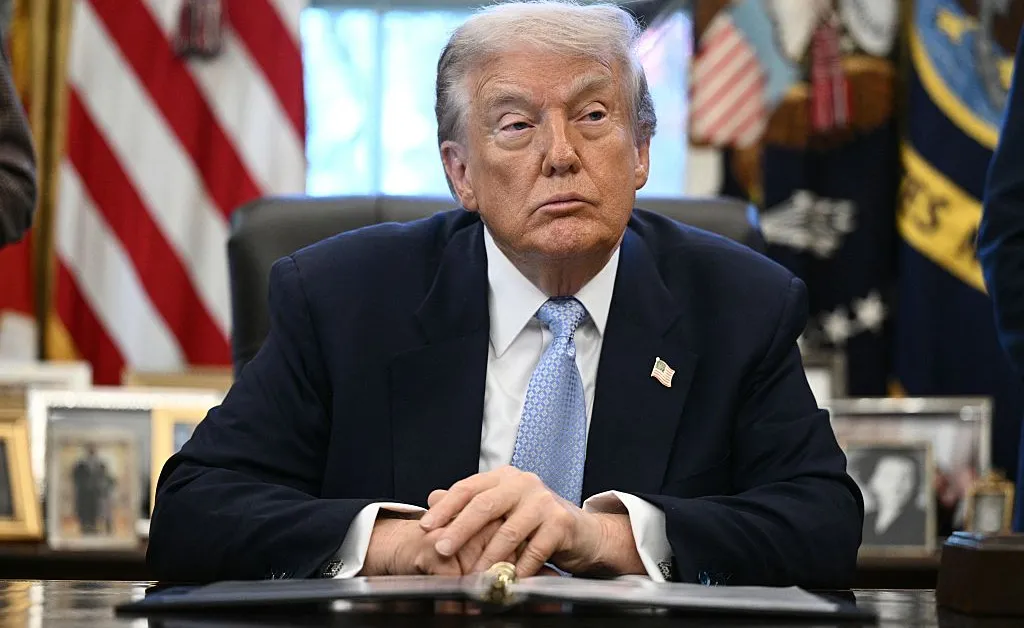President Donald Trump spent much of his first year back in office treating the mounting effort to force open the government’s closely held Jeffrey Epstein files as a political ambush. He publicly dismissed the legislation as a Democratic “hoax,” and fumed that it would tarnish his second-term agenda. At one point, his attorney general and the FBI director held a meeting in the White House Situation Room to pressure a key Republican supporter of the bill to drop it.
[time-brightcove not-tgx=”true”]
But on Wednesday night, after months of resistance and a rare bipartisan revolt in Congress, Trump signed the measure into law, ordering his Justice Department to release all of its investigative files on the convicted sex offender he once socialized with.
“I HAVE JUST SIGNED THE BILL TO RELEASE THE EPSTEIN FILES! As everyone knows, I asked Speaker of the House Mike Johnson, and Senate Majority Leader John Thune, to pass this Bill in the House and Senate, respectively,” Trump posted on Truth Social, while maintaining that “Democrats have used the ‘Epstein’ issue, which affects them far more than the Republican Party, in order to try and distract from our AMAZING Victories.”
It remains far from clear, however, whether the new law will produce the sweeping disclosure its supporters have demanded. Trump, like any president, could have directed the Justice Department to release the bulk of the material on his own authority but chose not to until Congress acted. The Justice Department has also shared little about how it intends to comply, and the legislation itself contains multiple exceptions that give Attorney General Pam Bondi considerable latitude to hold material back.
Under the law, the department may withhold documents if their release would jeopardize an active investigation or ongoing prosecution—a category that abruptly expanded in scope last week after Trump ordered a new inquiry into Epstein’s ties to several prominent Democrats. Officials could also point to grand jury secrecy rules or cite the presence of victim-identifying information, pornography or other deeply sensitive material that cannot be made public. And because the measure does not include explicit enforcement mechanisms, Congress would have limited recourse if the department invokes those provisions broadly or declines to release large portions of the files.
Some lawmakers and legal experts have warned that these carve-outs amount to an invitation for the Administration to sharply limit what is disclosed, even as Congress and survivors press for a comprehensive airing of Epstein’s crimes.
Nonetheless, the signing marks a significant milestone in a dispute that had tested the limits of Trump’s influence over his own party and is a welcome step for survivors of Epstein’s sex trafficking ring that have spent years urging lawmakers to release the files.
The Epstein Files Transparency Act directs the Justice Department to make public a broad collection of unclassified documents within 30 days, including flight logs, DOJ memos, internal correspondence, immunity deals, metadata, and more. The law permits redactions to protect the identities of victims, comply with rules governing grand jury secrecy, and avoid releasing illegal pornographic material.
The legislation overwhelmingly passed both chambers of Congress this week despite concerns from House Speaker Mike Johnson and other Republicans that the bill as written still might unfairly expose individuals not accused of wrongdoing. Johnson told MS Now Tuesday night that he spoke to Trump about the bill and was “deeply disappointed” it passed the Senate without any revisions. “We both have concerns,” Johnson said, throwing a potential wrinkle to a clash that has gripped Congress and the White House for months.
The bill’s path through Congress represented an extraordinary bipartisan break from a sitting President. For months, Trump’s allies in the House argued that the legislation lacked adequate privacy protections and that the House Oversight Committee was already making progress on an Epstein investigation through its own subpoenas. Johnson dismissed the bill as a political “show vote,” saying Democrats were trying “to tie President Trump somehow into this wretched scandal.”
But a small bloc of Republicans forced the issue. Rep. Thomas Massie of Kentucky, in particular, led the push by deploying a rarely used maneuver known as a discharge petition, which allows a majority of members to force a floor vote on legislation that leadership has blocked. After he co-introduced the bill along with Democratic Rep. Ro Khanna of California, they were joined by all Democrats and three additional Republicans in signing the petition: Reps. Marjorie Taylor Greene of Georgia, Lauren Boebert of Colorado, and Nancy Mace of South Carolina. The decisive 218th signature came after the delayed swearing-in of Democratic Rep. Adelita Grijalva of Arizona, triggering the House vote.
Survivors of Epstein’s abuse added additional momentum. Appearing alongside lawmakers at the Capitol on Tuesday, they expressed anger for what they saw as efforts by Trump and House Republicans to delay or block the release. “Your career is in front of you, and that choice will follow you,” said Haley Robson, holding a photograph of herself as a child. Jena Lisa Jones pleaded: “I’m begging you, President Trump, stop making this political.”
Dozens of Epstein survivors filled the House gallery during the vote, some crying and embracing as the overwhelming tally was read.
Trump’s past resistance to the bill came amid renewed scrutiny of his own past ties to Epstein, with whom he socialized in the 1990s and early 2000s. He has insisted they had a falling-out long before Epstein’s first arrest in 2006, and the White House has said he banned the financier from Mar-a-Lago.
Previously released documents have referenced Trump, but none have suggested wrongdoing. “I have nothing to do with Jeffrey Epstein,” Trump told reporters Tuesday. “I threw him out of my club many years ago because I thought he was a sick pervert.”
Still, Democrats accused the Administration of trying to keep potentially embarrassing material under wraps, especially after the Justice Department announced in July that it had found no “incriminating client list.” The House Oversight Committee subpoenaed the Justice Department and the Epstein estate, receiving partial and often duplicative files that only fueled suspicion.
Questions also swirled around whether the Justice Department would comply with the new law. Even as Congress moved toward passage, Attorney General Bondi offered only guarded comments when pressed. “We will continue to follow the law with maximum transparency while protecting victims,” she said Wednesday.
But the law’s exceptions could limit what the public ultimately sees. The Justice Department may cite the active federal investigation Trump ordered last week into Epstein’s ties to several prominent Democrats—including former President Bill Clinton, megadonor Reid Hoffman, and former treasury secretary Lawrence Summers—as grounds to withhold documents. Bondi said the top federal prosecutor in New York would take on the case.
In July, Bondi said the Epstein files contained no information that would lead the DOJ to investigate additional people, but reversed course on Wednesday without providing many details: “There is new information, additional information and, again, we will continue to follow the law and investigate any leads,” Bondi said.
Legal experts note that grand jury secrecy rules remain intact, and the bill does not override them. The department may also withhold materials deemed an “unwarranted invasion of personal privacy.”
Barbara McQuade, a former U.S. Attorney for the Eastern District of Michigan, told TIME last week that “if there is a pending investigation, the DOJ can assert executive privilege and try to prevent any more documents from being released.”
Some Republicans have said they hope the overwhelming vote totals would dissuade the Trump Administration from invoking those exceptions too aggressively. Democrats were more skeptical. “He must execute it faithfully,” Senate Minority Leader Chuck Schumer said on the Senate floor on Wednesday. “He must not use the excuse of frivolous investigations to release some Epstein documents while intentionally hiding others that deserve to be seen by the American public. This is not an invitation for Donald Trump to pick and choose his version of the truth.”
Schumer added: “If Donald Trump refuses to comply, if he refuses to obey the law, Senate Democrats will hold him accountable. We’ll exercise oversight, demand transparency, we’ll make it clear to the American people that Donald Trump has refused to come clean on Jeffrey Epstein.”
But because the legislation lacks an enforcement mechanism, Congress may face significant challenges if the Justice Department refuses broad disclosure. During Trump’s first term, Administration officials ignored multiple Congressional subpoenas. He has shown an even greater willingness to defy Congress in his second.
The post Trump Signs Bill Ordering Release of Epstein Files appeared first on TIME.




